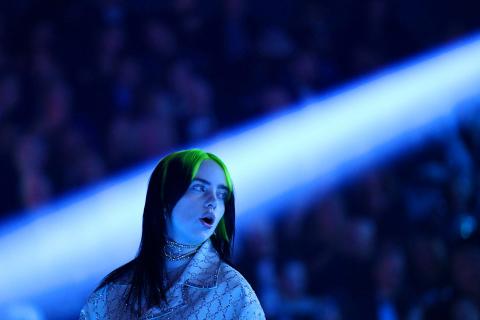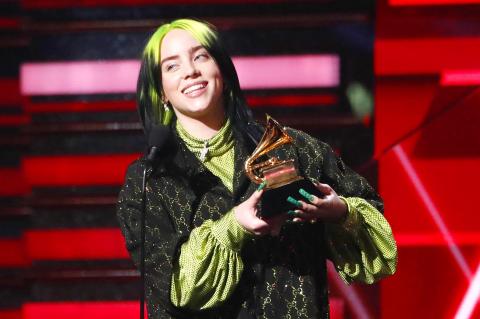The embodiment of cool with haunting, gravelly vocals and original punk-rock style, Billie Eilish has redefined the contemporary pop star on her blistering path to stardom.
And now the teenage mover and shaker has cemented her place as an establishment leader, posting a banner Grammy night by sweeping the top four categories — the first woman and youngest artist to do so.
The 18-year-old’s phenomenal ascent saw Eilish named Billboard’s 2019 woman of the year — and for good reason. Within a matter of months, she dropped a number one album entitled When We All Fall Asleep, Where Do We Go?, led the hot songs chart with her single Bad Guy and played a set on a prime stage at the Coachella music festival that was pure fire.

Photo: AFP
The biggest globally renowned musician to emerge from Generation Z, the candid Eilish draws young fans with a personal social media presence and Internet-speak fluency.
And with a fashion sense as unique as her sound, Eilish is the kind of female star who refuses to let the sexualization of her body define her celebrity.
At just 13, she dropped her debut bedroom-produced single Ocean Eyes on SoundCloud, the do-it-yourself streaming platform that has also brought a generation of young rappers to fame.

Photo: REUTERS
The gauzy synth-pop song about painful longing to reconnect with an ex — written and produced by Eilish’s primary creative collaborator, her brother Finneas O’Connell — quickly went viral.
Interscope signed her at age 14 — making the Californian a rare Internet-age pop star to win big online and then see a label invest time and money in cultivating her talent over the long term.
But despite the industry input, Eilish appears to be a singular star whose only influencer is herself.
She deftly imbues often morbid lyrical content — topics include death, depression and fear over climate change — with tinges of irony and humor.
The performer — who has cited grunge band Nirvana as inspiration — delivers poetry in a breathy voice bordering on a whisper, layered over minimal beats akin to electronic music and southern hip-hop.
Put on the spot, Eilish oozes eminent chill — though the nerves of adolescence sometimes peek through.
“We made this album in a bedroom,” she said backstage at the Grammys on Sunday after scooping five trophies, standing next to O’Connell, to whom she routinely gave the mic.
“It’s really like anything is possible, actually,” she added with a wry giggle.
‘CONFUSED AND GRATEFUL’
The superstar’s signature style features oversized sweatshirts and baggy pants, often paired with sunglasses and the garish extra-long nail extensions more often associated with rapper Cardi B.
On Grammy night, she wore an oversized Gucci pantsuit with glittering lime green accents — that matched her neon-dyed roots — and even sported a sheer black face mask on the red carpet.
The star has described her body image as “toxic,” and spoken openly about mental health struggles — a growing movement in the music industry, which has lost scores of stars young and old to suicide and overdose.
“Wow, wow, wow, wow,” Eilish began her speech in accepting the award for Bad Guy.
“So many other songs deserved this, I’m sorry.”
Her 22-year-old brother later said:”We didn’t think this would ever win anything.”
“We didn’t write an album to win awards. We wrote an album about depression, about suicidal thoughts, about climate change,” he continued.
“We stand up here confused and grateful.”
WIN-WIN FOR WOMEN
The young Eilish has flatly dismissed the industry’s habit of drumming up publicity and drama by pitting female stars against each other.
She champions women as peers rather than rivals, emphasizing that the success of one performer does not steal from another.
“Everybody’s always trying to make everybody compete,” she told the Los Angeles Times last year. “They’re like, ‘Billie’s album might pass Ariana’s.’”
On Sunday, Eilish gave a shout-out to Grande, saying the pop royal’s album thank u, next should have won the night’s prestigious Album of the Year award.
She’s also lauded fellow Album of the Year nominee Lana Del Rey, a masterful lyricist who, like Grande, went home empty-handed on Sunday.
“I don’t want to hear that Billie Eilish is the new Lana Del Rey. Do not disrespect Lana like that! That woman has made her brand so perfect for her whole career and shouldn’t have to hear that,” Eilish once said of the baroque pop troubadour whose languorous, deadpan album last year was hailed by many as the year’s best. “I don’t want to hear that somebody’s the new Billie Eilish in a couple of years.”
That prospect appears unlikely considering the superstar’s inimitable idiosyncrasies, raw talent and meteoric rise that now includes plenty of Grammys gold.
“What’s next? I don’t know — be in this moment is all I’m thinking about,” she told reporters Sunday backstage.
As the now classic lyric from Bad Guy goes.... duh.

The canonical shot of an East Asian city is a night skyline studded with towering apartment and office buildings, bright with neon and plastic signage, a landscape of energy and modernity. Another classic image is the same city seen from above, in which identical apartment towers march across the city, spilling out over nearby geography, like stylized soldiers colonizing new territory in a board game. Densely populated dynamic conurbations of money, technological innovation and convenience, it is hard to see the cities of East Asia as what they truly are: necropolises. Why is this? The East Asian development model, with

June 16 to June 22 The following flyer appeared on the streets of Hsinchu on June 12, 1895: “Taipei has already fallen to the Japanese barbarians, who have brought great misery to our land and people. We heard that the Japanese occupiers will tax our gardens, our houses, our bodies, and even our chickens, dogs, cows and pigs. They wear their hair wild, carve their teeth, tattoo their foreheads, wear strange clothes and speak a strange language. How can we be ruled by such people?” Posted by civilian militia leader Wu Tang-hsing (吳湯興), it was a call to arms to retake

This is a deeply unsettling period in Taiwan. Uncertainties are everywhere while everyone waits for a small army of other shoes to drop on nearly every front. During challenging times, interesting political changes can happen, yet all three major political parties are beset with scandals, strife and self-inflicted wounds. As the ruling party, the Democratic Progressive Party (DPP) is held accountable for not only the challenges to the party, but also the nation. Taiwan is geopolitically and economically under threat. Domestically, the administration is under siege by the opposition-controlled legislature and growing discontent with what opponents characterize as arrogant, autocratic

When Lisa, 20, laces into her ultra-high heels for her shift at a strip club in Ukraine’s Kharkiv, she knows that aside from dancing, she will have to comfort traumatized soldiers. Since Russia’s 2022 invasion, exhausted troops are the main clientele of the Flash Dancers club in the center of the northeastern city, just 20 kilometers from Russian forces. For some customers, it provides an “escape” from the war, said Valerya Zavatska — a 25-year-old law graduate who runs the club with her mother, an ex-dancer. But many are not there just for the show. They “want to talk about what hurts,” she